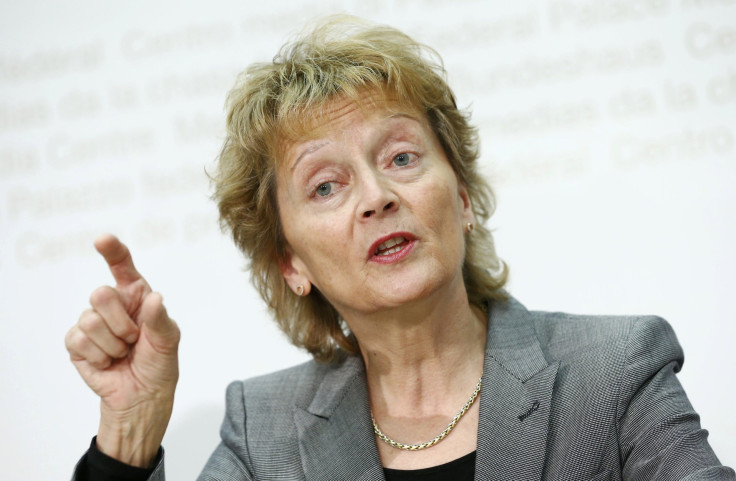Swiss Economy Will Weather Swiss Franc Storm, Finance Minister Says

ZURICH (Reuters) -- Swiss officials sought to reassure the country Sunday that a shock decision by its central bank to scrap its cap on the franc would not destabilize the economy ahead of a crucial week in which the European Central Bank could announce a massive bond-buying program. Finance Minister Eveline Widmer-Schlumpf said she anticipates the exchange rate to settle down at around 1.10 francs per €1.00, a level she believes companies in the export-orientated country should be able to withstand.
“I’m confident that the economy will be able to cope with this decision. Companies are in a far better position than in 2011 when the cap was introduced,” she told the SonntagsBlick and Schweiz am Sonntag newspapers.
The Swiss National Bank stunned markets Thursday when it abandoned its three-year-old cap of 1.20 francs per €1.00, saying the policy had become unsustainable. The move sent the franc soaring, prompting firms across Switzerland to warn of a plunge in profits, with the luxury, industrial and tourism sectors most exposed.
With inflation already running at -0.3 percent year-on-year, Switzerland also risks importing deflation should the franc stay at its high level against the euro.
Hans Hess, president of Swissmem, which represents companies in the machinery, electronic and metalworking sectors, told the NZZ am Sonntag paper that one in five Swiss industrial firms faced an “existential threat.” He said, “The abolition of the cap will cost jobs, but the sector overcame the franc crisis in 2011 and will also cope with this crisis.”
The franc broke past parity following the SNB’s announcement, hitting a high of 0.85 per €1.00 before trimming gains. The franc was trading at a whisker below parity with the euro Friday.
How much room for maneuver the SNB has could depend on what the ECB announces Thursday, when it is expected to launch a government bond-buying program to revive the economy and combat deflation.
If the ECB exceeds market expectations, investors may pile into the safe-haven franc, putting the SNB under more pressure to act.
Some economists and officials said the exchange rate needs to gravitate toward the 1.10 per €1.00 level to prevent potential damage to the economy.
If the currency were to stay at parity for a long time, it would lead to very weak economic growth and rising unemployment, Finance Department Director Serge Gaillard told the Zentralschweiz am Sonntag paper.
SNB President Thomas Jordan said reaction to the decision to scrap the cap had been overdone.
Charles Wyplosz, professor of international economics at the Graduate Institute in Geneva, said he believed the SNB may have intervened in the currency markets Friday to keep the franc at parity with the euro.
(Reporting by Caroline Copley; Additional reporting by Noah Barkin; Editing by Rosalind Russell)
© Copyright Thomson Reuters 2024. All rights reserved.




















